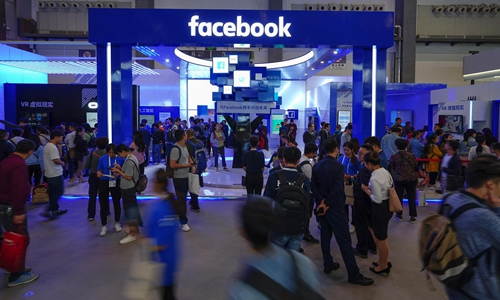Zuckerberg tears away last piece of camouflage
By GT staff reporters Source: Global Times Published: 2020/8/24 20:03:44
Double-faced, disgraceful move will backfire on Facebook

Facebook's booth at the International Big Data Industry Expo in May 2018 in Guiyang, Southwest China's Guizhou Province Photo: VCG
Mark Zuckerberg, CEO of US technology giant Facebook, is reportedly the one who has stoked US fears over Chinese competitor TikTok, after claiming there is "ample evidence" that China stole US technology. But ironically years ago, he praised "great Chinese companies," called China's history "a story of innovation," and wished the Chinese people a Happy Chinese New Year in Mandarin.
The move not only shows Zuckerberg's double standards and unscrupulous behavior in the face of business interests, but also deals a blow to so-called American values - which have long been cherished and admired in China and globally, analysts said.
Thanks to Zuckerberg, Facebook also sets a very bad example for the global internet industry, which should advocate openness and fairness, they said.
The comments come as a report said Zuckerberg was the one who stoked the US government's fears about TikTok, as he emphasized threats from Chinese internet firms in a bid to fend off US regulation of Facebook.
Zuckerberg made the case to US President Donald Trump in a private dinner at the White House in late October last year, saying that the rise of Chinese internet companies threatens American business supremacy, and that this should be a bigger concern than reining in Facebook, according to a report by the Wall Street Journal.
According to the report, Zuckerberg also discussed TikTok specifically in meetings with US senators, according to people familiar with the meetings. Soon after, the US government began a national security review of TikTok and by spring this year, Trump began threatening to ban the app entirely.
In early August, Trump signed an executive order demanding that TikTok's Chinese owner, ByteDance, divest itself of its US operations.
"Zuckerberg's move is fully within expectations, since if TikTok is banned and its development is curbed in the US market, the biggest beneficiary would be Facebook and himself," Fang Xingdong, founder of Beijing-based technology think tank ChinaLabs, told the Global Times.
"It has imitated and copied TikTok to try to sustain its dominance, but it failed, that's why it chose to politicize a business problem and hoped to contain TikTok in such a disgraceful way," Fang said.
ByteDance said in early August that it was facing "complex and unimaginable difficulties" in the process of becoming an international company, including international political tension and cultural clashes. It mentioned "copying and slandering" by its competitor Facebook.
TikTok has gained 100 million US users and become the biggest threat to Facebook, which had about 250 million monthly users in the US and Canada as of the end of June, according to media reports.
"A US ban and restructuring under any potential buyout could curb the development momentum of TikTok, and may spark a brain drain - which is exactly what Facebook wants," Liu Gang, director of the Nankai Institute of Economics and chief economist at the Chinese Institute of New Generation Artificial Intelligence Development Strategies, told the Global Times Monday.
"Zuckerberg is using a very disgraceful strategy - stoking domestic nationalism at a special time and using non-market behavior to crack down on a rival it cannot compete with," Liu said.
Analysts said that the move would set a bad example for the global internet industry, bury Facebook's prospects in China's market, and ruin its global reputation.
Zuckerberg's move to blame China became aggressive in public in late July, when he used Chinese companies and China as targets in advance of a Congressional hearing on tech companies' potential antitrust violations. This was a reversal of his attitude when he said he was planning to learn Mandarin, and when he made several well-publicized trips to China when Facebook sought opportunities of getting back into the lucrative Chinese market.
Given the adversarial relationship between Washington and Beijing, it's an argument that may have some appeal in the US. It caters to the poisonous political atmosphere in Washington that has increasingly maintained that Chinese companies pose an existential threat to the US in terms of values, technological superiority and national security, analysts said.
"It tells us and maybe global consumers never to trust Zuckerberg, the double-faced CEO who shows the true face of capitalism, and it has buried Chinese people's impressions of American values," a netizen named fanghongshu said on Weibo, China's Twitter-like social media platform, on Monday.
ByteDance confirmed on Sunday that it would file a lawsuit Monday (US time) against the Trump administration over the executive order.
China supports relevant companies in using legal weapons to safeguard their legitimate rights and interests, and it will continue to take all necessary measures to resolutely safeguard the legitimate rights and interests of Chinese companies, Zhao Lijian, spokesperson of the Chinese Foreign Ministry, told a regular press conference on Monday.
Posted in: COMPANIES